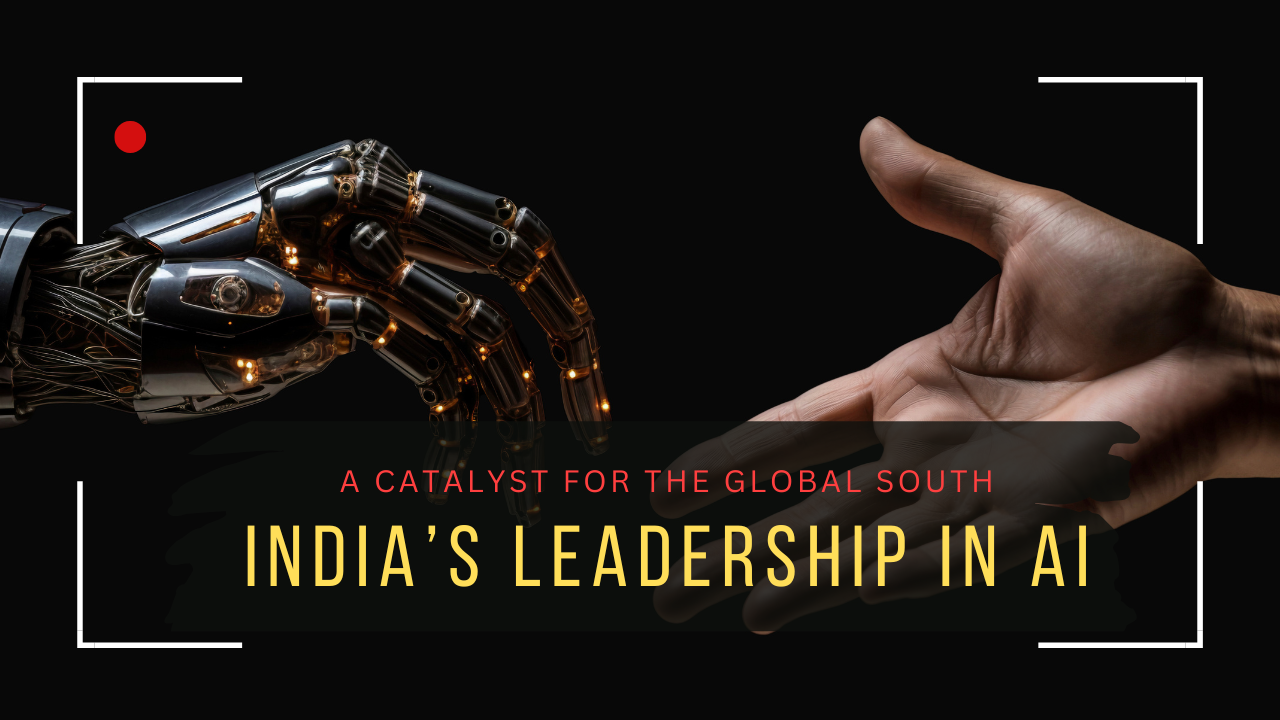India’s Leadership in AI: A Catalyst for the Global South
Introduction
Artificial Intelligence (AI) is rapidly transforming economies and societies, yet its benefits remain unevenly distributed across the world. While nations in the Global North—such as the United States, China, and members of the European Union—have invested heavily in AI research, infrastructure, and talent, the Global South continues to lag behind, largely excluded from shaping AI’s global trajectory. This disparity threatens to deepen technological inequalities, reinforcing economic divides and diminishing the ability of developing nations to harness AI’s potential for their own growth.
As India steps into the role of co-chair at the AI Action Summit in Paris, it is presented with an opportunity to challenge this status quo. By advocating for greater inclusion, equitable resource distribution, and AI frameworks tailored to the needs of developing nations, India can help establish a fairer AI ecosystem—one that serves the entire world, rather than a select few.
Democratising AI Resources for All
One of the most urgent concerns for the Global South is the monopolisation of AI resources by a handful of powerful nations and corporations. Cutting-edge AI development relies on access to vast computing power, expansive datasets, and robust research networks—resources that remain concentrated in North America, Europe, and parts of East Asia. This disparity means that most AI innovation originates from these regions, while developing countries are often left as passive consumers rather than active contributors. To counteract this imbalance, India must advocate for democratising AI resources by promoting open-source AI models, ensuring fair access to foundational models, and fostering international AI research collaborations.
India’s own initiative of creating a national computing facility with 18,600 GPUs and a 40% government subsidy serves as a compelling model for how nations can invest in AI accessibility. However, India should push for broader global policies that prioritise shared AI infrastructure, technology transfers, and cooperative AI development models. By leading this charge, India can help smaller nations develop their own AI ecosystems rather than relying entirely on AI-driven technologies from wealthier countries.
Tailoring AI for Local and Regional Needs
Beyond the issue of accessibility, AI must also be designed with local and regional needs in mind. Far too often, AI applications are created in advanced economies without consideration for the distinct challenges and contexts of the developing world. Many AI solutions become “technology-first” rather than “problem-first”—in other words, they are solutions in search of problems rather than being tailored to real-world needs. India must push for the establishment of an AI use-case repository that prioritises applications suited to the unique conditions of the Global South.
AI-driven healthcare solutions, for instance, could be adapted for regions with limited medical infrastructure by focusing on early disease detection through mobile diagnostics. Similarly, AI-powered educational tools could be designed to accommodate linguistic diversity and localised learning styles. In agriculture, AI models could be calibrated to support small-scale farmers by providing predictive weather analytics and real-time soil analysis. By ensuring that AI is not just globally powerful but also locally relevant, India can help foster innovation that serves diverse populations rather than a singular economic elite.
Ensuring Fair and Inclusive AI Governance
AI governance remains another critical issue, with regulatory frameworks currently being shaped predominantly by the concerns of developed nations. Many AI policies in the Global North revolve around data privacy, misinformation, and corporate monopolies—pressing issues, to be sure, but not always reflective of the challenges faced by the Global South. Algorithmic biases, cultural homogenisation, and the economic disruptions caused by AI-driven automation are just as crucial, yet they often receive less attention in international discussions. For example, AI models trained on predominantly Western datasets can reinforce cultural biases, leading to systemic discrimination in hiring practices, healthcare diagnostics, and even law enforcement applications.
Similarly, AI-driven automation poses a significant risk to labour markets in developing countries, where large segments of the workforce remain in industries highly vulnerable to job displacement. At the AI Action Summit, India should champion governance frameworks that mandate bias audits, ensure equitable AI representation, and balance innovation with fair regulatory oversight. Moreover, India must advocate for governance policies that do not impose overly restrictive regulations on emerging economies, allowing them the flexibility to innovate without unnecessary bureaucratic barriers.
Harnessing AI for Social Good
While governance is vital, India must also push for AI to be harnessed as a force for social good. AI has the potential to revolutionise public services, particularly in regions where traditional infrastructure remains underdeveloped. India itself offers numerous case studies on how AI can be used for societal benefit. The Aadhaar system, the world’s largest biometric identity programme, has helped streamline government services, improve financial inclusion, and combat welfare fraud.
The CoWIN platform, which facilitated India’s COVID-19 vaccination rollout, leveraged AI-driven analytics to optimise vaccine distribution in one of the world’s most complex public health operations. AI-driven agricultural tools have enabled farmers to predict crop yields, detect soil deficiencies, and optimise water usage, helping to boost food security in a country where agriculture remains the backbone of the economy. India should use these experiences to advocate for international AI development strategies that prioritise public interest applications, particularly in healthcare, education, agriculture, and disaster management.
India as a Diplomatic Bridge in AI Policy
India’s co-chairing of the AI Action Summit also presents an opportunity to solidify its diplomatic role as a bridge between AI superpowers and emerging economies. The AI landscape is increasingly shaped by competition between the United States, China, and the European Union, each of whom seeks to establish dominance in AI governance. Within this geopolitical context, the needs of the Global South are frequently sidelined.
As a nation that maintains strong diplomatic ties with both developed and developing economies, India is well-positioned to mediate AI policy discussions, ensuring that the interests of smaller nations are not drowned out by the ambitions of AI giants. India must push for AI governance models that foster international cooperation rather than deepening global divisions. This includes advocating for flexible, risk-based AI regulations that distinguish between high-risk AI applications—such as autonomous military systems or AI-driven financial markets—and lower-risk AI tools used for development and social welfare.
Paving the Way for the Next AI Action Summit
Looking beyond the summit, India’s leadership at the AI Action Summit could position it as a frontrunner to host the next AI Action Summit, further cementing its role as a global AI leader. Hosting such an event would allow India to continue amplifying the perspectives of the Global South and fostering discussions on equitable AI development. Moreover, it would provide a platform for India to showcase its own AI advancements and build stronger international AI partnerships. The long-term goal should be to establish AI as a truly global resource—one that is developed with inclusivity, fairness, and shared prosperity at its core.
Conclusion
The AI Action Summit in Paris represents a critical juncture in global AI governance, and India’s role as co-chair carries significant weight. By championing equitable access to AI resources, advocating for ethical and context-aware AI policies, and ensuring AI is deployed for social good, India can help reshape the future of AI in a way that prioritises inclusivity and fairness. The AI revolution must not be confined to the wealthiest nations—it must serve humanity as a whole. Through strong leadership, diplomatic engagement, and a commitment to bridging the AI divide, India can help build a future where AI benefits not just a privileged few, but millions across the Global South and beyond.
Subscribe to our Youtube Channel for more Valuable Content – TheStudyias
Download the App to Subscribe to our Courses – Thestudyias
The Source’s Authority and Ownership of the Article is Claimed By THE STUDY IAS BY MANIKANT SINGH


